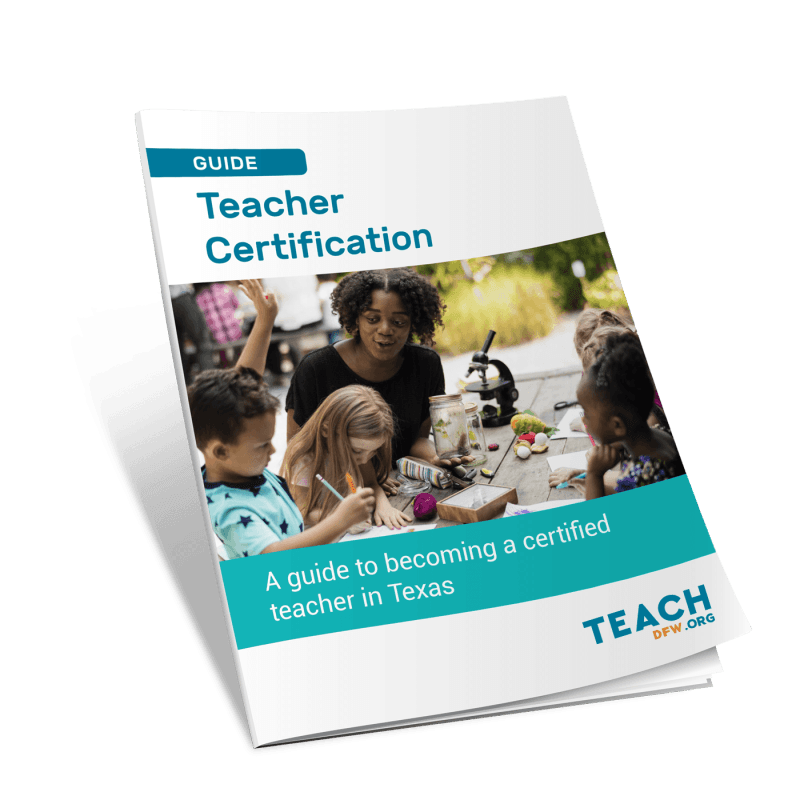TEACH experts explain the basics of teacher certification and answer common questions. For DFW-specific details, keep reading this page!
When you apply to a teaching program, you’ll choose the subject and grade level you want to teach. Not sure yet? That’s totally normal.
Here’s a tip: Some subjects are in high demand—like special education, bilingual education and STEM. Getting certified in one of these areas can lead to more job opportunities across Texas.
Once you know what you want to teach, your next step is to find the certification path that fits your education level—and apply to a program that gets you there.
If you already have a bachelor’s degree, you’re eligible for certification-only programs, master’s + certification programs or alternative certification pathways.
If you don’t have a degree yet, some programs let you earn your bachelor’s and teaching certificate at the same time. And if you’ve worked in fields like construction, health science or tech, you might even qualify to teach Career & Technical Education (CTE) without a degree.
When you're ready to apply, look for a program that offers your certification area and fits your schedule, experience and goals.
TeachDFW can help you reduce the cost of becoming a teacher. You can apply for a TeachDFW scholarship and use our Financial Aid Explorer to discover grants, scholarships and other funding opportunities.
Plus, some teaching programs will pay you to start teaching while you earn your certificate.
To earn your certificate, you’ll take a test called the TExES—short for Texas Examinations of Educator Standards. It’s designed to make sure you know your subject well enough to teach it.
You’ll usually take your exams near the end of your program, and your program will let you know when you’re eligible to register.
Need a study plan? We’ve got you covered with test prep tips, study guides and everything else you need to feel confident on test day.
Almost there! Once you’re eligible, you’ll apply to the State of Texas for a certificate. Don’t worry though, your teaching program will walk you through this part.
The best, most memorable teachers are the ones who really love their teaching subjects! Whether you nerd out on languages or get excited about history, let your passion and experience be your guide.
Hear from teachers in Pre-K, science, language arts and more about why they love teaching.

Download our guide to Texas teacher certification to learn about specific subject areas and keep all the details handy. You can also visit our online Guide to Texas Certification Areas.

Often called an “educator preparation program,” a teaching program helps you learn the ropes in a classroom setting.
Even if you know a lot about your subject, it can be hard to know how to teach it to others. It’s a special skill and it doesn’t always come naturally.
In your teaching program, you’ll build real skills that matter: designing creative lessons, managing a classroom with confidence, and adapting your teaching to support every student, no matter their learning style or background.
Learn how to choose the right teaching program.
Sign up to access our complete Program Explorer tool.

If you have a degree, alternative certification lets you start a teaching job while you complete an educator preparation program.
With an alternative teaching certificate, you can:

Sign up for a TeachDFW account to search our database of scholarships, grants, fee reimbursements and more with our Financial Aid Explorer.
Sign up to access our complete Financial Aid Explorer tool.

Ready to make a difference in the classroom? Whether you're interested in becoming a teaching assistant, substitute or lead teacher, our Jobs page is a great place to start. You can also dive right into open roles on the full Job Board.
Curious what it’s really like? Meet local educators on our Schools & Community page and hear why they love teaching in DFW.
Talk to an expert about how to become a certified teacher in Dallas-Forth Worth. Get free advice on what to teach and how to choose and apply to the right program.
Read MorePut your best foot forward when applying to teacher preparation programs in Dallas-Fort Worth. Guides deliver best practices for each step along the way, from studying for exams to applying for jobs and internships.
Read MoreEnter your email to get FREE resources for future Texas teachers—from tailored advising to funding opportunities and more. Already signed up? Sign in at the top of the page to access your dashboard.
Learn how to earn a Texas teaching certificate and start teaching in Dallas-Fort Worth in our comprehensive step-by-step guide. Bookmark this page or get the full PDF guide.

The right path will depend on your background, education and career experience.
On this page, we’ll go over each step you’ll need to take, plus answer some commonly asked questions about certification. Let’s dive in!
To get certified, you’ll need to pass the TExES exam, which makes sure you’re classroom-ready.
There are two required parts:
Bonus exam alert: If you're planning to teach early grades or core subjects, you'll also take the science of teaching reading exam. It focuses on how kids learn to read—super important, especially in the early years.
Not sure where to start with test prep? We’ve got tools for that too! Our Testing Guide and TExES Guide cover everything you need to know about preparing for your exams.